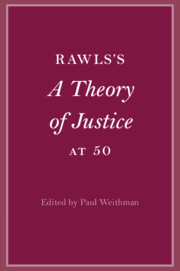Book contents
- Rawls’s A Theory of Justice at 50
- Cambridge Philosophical Anniversaries
- Rawls’s A Theory of Justice at 50
- Copyright page
- Dedication
- Contents
- Figures
- Contributors
- Acknowledgments
- Abbreviations of and Bibliographic Information for Rawls’s Works
- Introduction
- Part I Rawls and History
- 1 Taillight Illumination
- 2 The Theory Rawls, the 1844 Marx, and the Market
- 3 Rawls, Lerner, and the Tax-and-Spend Booby Trap
- 4 Rawls’s Principles of Justice as a Transcendence of Class Warfare
- 5 The Significance of Injustice
- Part II Developments between A Theory of Justice and Political Liberalism
- Part III Rawls, Ideal Theory, and the Persistence of Injustice
- Part IV Pluralism, Democracy, and the Future of Justice as Fairness
- References
- Index
5 - The Significance of Injustice
from Part I - Rawls and History
Published online by Cambridge University Press: 20 July 2023
- Rawls’s A Theory of Justice at 50
- Cambridge Philosophical Anniversaries
- Rawls’s A Theory of Justice at 50
- Copyright page
- Dedication
- Contents
- Figures
- Contributors
- Acknowledgments
- Abbreviations of and Bibliographic Information for Rawls’s Works
- Introduction
- Part I Rawls and History
- 1 Taillight Illumination
- 2 The Theory Rawls, the 1844 Marx, and the Market
- 3 Rawls, Lerner, and the Tax-and-Spend Booby Trap
- 4 Rawls’s Principles of Justice as a Transcendence of Class Warfare
- 5 The Significance of Injustice
- Part II Developments between A Theory of Justice and Political Liberalism
- Part III Rawls, Ideal Theory, and the Persistence of Injustice
- Part IV Pluralism, Democracy, and the Future of Justice as Fairness
- References
- Index
Summary
The concept of justice that A Theory of Justice theorizes is, as Rawls puts it early on, “the proper distribution of the benefits and burdens of social cooperation.” Shortly thereafter, he comments, “Now this approach may not seem to tally with tradition.” The topic of this essay is the difference between Rawls’s concept of justice and the traditional one. My main observation is that the significance of injustice in Rawls’s sense is very different from the significance of injustice in the traditional sense. Traditional injustice entails that someone has been wronged in a way that warrants resentment, guilt, and indignation. Injustice in Rawls’s sense does not entail this.
Keywords
- Type
- Chapter
- Information
- Rawls’s A Theory of Justice at 50 , pp. 95 - 106Publisher: Cambridge University PressPrint publication year: 2023

